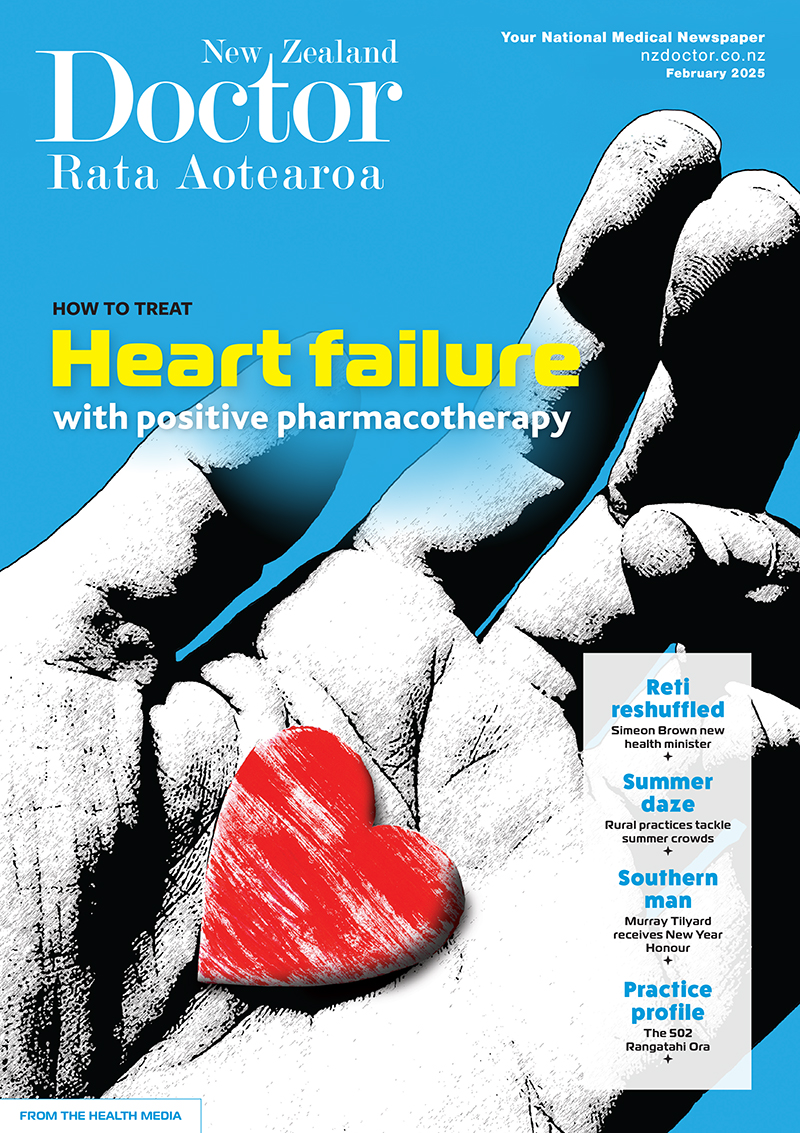Pharmacist prescribers Linda Bryant and Leanne Te Karu discuss positive polypharmacy for heart failure. Current evidence shows the intensive implementation of four medications offers the greatest benefit to most patients with heart failure, with significant reductions in cardiovascular mortality, heart failure hospitalisations and all-cause mortality
Be it knight or knave, there’s no returning to ‘give us the money’ in health sector
Be it knight or knave, there’s no returning to ‘give us the money’ in health sector

The definition of a professional has long been tied to a certain degree of freedom of action. But funding structures demand accountability, writes Tim Tenbensel
this “light-touch” accountability arrangement allowed Harold Shipman in England and “the unfortunate experiment” in Auckland, to flourish
The definition of a professional has long been tied to a certain degree of freedom of action. But funding structures demand accountability, writes Tim Tenbensel
Two of the most fascinating words in public policy are “responsibility” and “accountability”. For those of us working in the health system, I like to think of these words as a linguistic equivalent of a Rorschach inkblot test. Ponder these two words for a moment. Do they mean the same thing, or are they opposites? Do one or both words give you a cosy feeling of satisfaction or fill you with dread?
Both words are pertinent in identifying to whom and for what we answer to in our work, and how we are answerable.
For those who have embarked on professional careers, arguably one of the most attractive features of this career is the relative autonomy (compared with parking inspectors, shop assistants, for example) we have over the work that we do and how we do it. Over many years we develop a sense of “intrinsic” responsibility – we are answerable to ourselves, but it is our higher self, shaped by the values, ethics and norms of our profession. In this way, we are answerable to fellow members of our professional tribe for the quality of our work.
Hospitals remain relatively sheltered from this regime, small NGO service providers are often subject to considerable contractual micro-management, while primary care sits somewhere in the middle
According to Eliot Freidson, a pre-eminent sociologist of professions, one of the hallmarks of a professional has been the project of minimising the reach of “external” accountability requirements to the state or to the market, while maximising the scope of “intrinsic” responsibility to oneself and one’s peers. When health professionals are the primary arbiters of performance, the quid pro quo is that patients, the broader public and governments that represent them can, and should, trust the health professionals and just let them get on with it.
The influential British social policy adviser and academic Sir Julian Le Grand describes such a health system as one based on the assumption of “knightly” behaviour of professionals.
For some, the mid-20th century represents a golden age of health systems based on responsible professionalism. For others, this “light-touch” accountability arrangement allowed Harold Shipman in England and “the unfortunate experiment” in Auckland, to flourish. Sir Julian famously contrasted “knavish” motivations to knightly ones, and suggested that health systems should assume both types are ever-present.
Since the 1980s, the emphasis on independent, external “verification”, alongside or in place of trust, has gained considerable momentum. Health professionals are heavily dependent on the state for providing the means to practise or supporting professional livelihoods.
Inevitably, government funding places health sector professionals in a chain of formal accountability to the public – a chain that connects providers to public funders, to ministers, to Parliament and, ultimately, to the electorate.
The Treasury officials of the 1980s who spearheaded the redesign of New Zealand’s government sector were firmly of the view that in this public system, it was better to assume providers were knaves rather than knights, and that this required new systems of independent verification and extrinsic accountability regimes. Their efforts to build such systems through contract-based accountability have clearly permeated the health system, though the degree of impact varies considerably.
Hospitals remain relatively sheltered from this regime, small NGO service providers are often subject to considerable contractual micro-management, while primary care sits somewhere in the middle. The predominant result has been plenty of accounting for things that are not really that meaningful – the excessive emphasis on reporting outputs and processes. These extrinsic pressures clearly erode intrinsic motivation and trust of professionals and provider organisations.
As such, the regime of verification we have built in New Zealand has not been that helpful in determining how good a job our health providers (both individual practitioners and organisations) do.
Yet the genie is out of the bottle, and we are unlikely to return to a “give us the money and trust us” health system which is untenable in a democratic context. This does not happen in any other arena of public policy, and while health policy is distinctive in many respects, it is not that special.
In primary care currently, there remain vastly different ideas about the appropriate balance between trust and verification, between provider-based responsibility and accountability to external constituencies.
Ever since PHOs began, there have been conflicting signals from central government. On the one hand, the Ministry of Health and DHBs built a formal, highly transactional regime of contractual accountability with detailed specifications of performance requirements that tie up considerable organisational resources. In other respects, key parts of the system have evolved in a highly ad hoc manner, with very loose or non-existent requirements of PHOs.
For example, good luck to any journalist, academic or member of the public who wants to know how PHOs across the country spend their flexible-funding pool. This information does not exist in any publicly available form, even though this funding is a key instrument of primary care policy and citizens are entitled to have some idea of how it is working.
Achieving a workable regime incorporating both trust/responsibility and verification/accountability is clearly an ongoing challenge, and the expectations of PHOs remain a key element of the unfinished business of the Primary Health Care Strategy’s implementation. This ball is now well and truly in the court of Heather Simpson’s review. I just hope that the blueprint her team produces does not resemble one of those inkblots.
Tim Tenbensel is associate professor, health policy, in the School of Population Health at the University of Auckland
We've published this article as a FREE READ so it can be read and shared more widely. Please think about supporting us and our journalism – subscribe here



